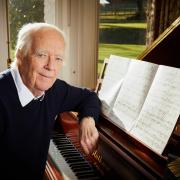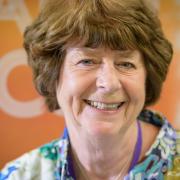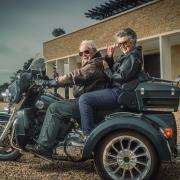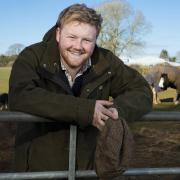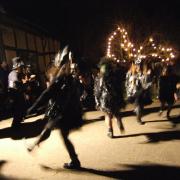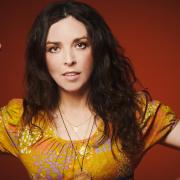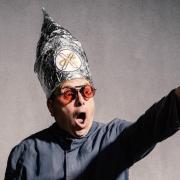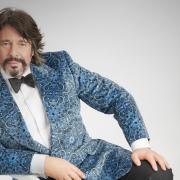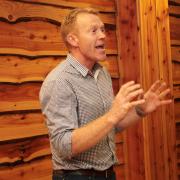Favourite media doctor and part-time Stroud GP Dawn Harper is well known for her work on Channel 4's Embarrassing Bodies, sensitively and sympathetically lifting the lid on 'hidden' illnesses and conditions that cause shame and misery. S...
"Whatever it is, you won't be the first and you certainly won't be the last." Dr Dawn Harper on Embarrassing Bodies.
Odd thing, really. Here's the comely Dr Dawn Harper in her archetypal Cotswold farmhouse, overlooking a valley straight out of Laurie Lee, and all I can think about are anal warts. Bad breath. Unwanted facial hair.
"You ought to hear my children," she says. "'Oh mum. How could you do that! I'm not going to school tomorrow'." She laughs. "Sadly, I think it has put them all off following a career in medicine!"
There are doctors who save lives by being the first at the scene of a car crash; others perform miracles on operating tables. And then there are the Dr Dawns of this world, unafraid to examine testicles (someone else's, obviously) in front of the nation's television cameras as naturally as Nigella poaching a couple of eggs.
OK - you're allowed 30 seconds to giggle and smirk. We all do it. We all find bodies - our own, particularly - grossly humiliating at times. But one of the most life-saving acts you can perform is to give someone the courage to knock on a consulting room door with a medical problem they've never been able to tell anyone about: there's nothing worse than dying of embarrassment.
For anyone unacquainted with Embarrassing Bodies, it's a Channel 4 series and BAFTA-winning website where Dawn and a team of fellow doctors treat volunteer patients for the sorts of ailments that make your toes curl. (In the patients' cases, of course, it's usually more exotic parts of the body that have curled.)
"I cannot count the number of interviews I have done for various press where I was asked the most shocking thing I saw," Dawn says. "I can tell you, hand on heart, that everything I viewed or examined is what every GP up and down the country sees every day of the week.
"What was shocking was how desperate people are that they would come on television."
She's right; it is, quite frankly, astonishing. The programme never fails to produce patients who are willing, in spite of the nature of their problems, to give their names, and allow themselves to be fully filmed. There's a Mr Webster who exposes his haemorrhoids to the world (he's 55 and had them since his early teens); a young care worker with such bad psoriasis, one of her clients thought she was a leper and refused to have anything to do with her. And then there was the woman with asymmetrical breasts who revealed her husband of eight years had never even seen them: "It makes me feel sick about me; I think I'm ugly and people stare," she says. Before you view any of these consultations, which are still available online (you can search by A-Z of conditions or by body parts), there's a warning: the videos you're about to see contain images of an explicit medical nature and nudity in a medical context... But as you watch, you begin to see these clips as neither embarrassing nor voyeuristic: often, they're moving in the extreme. Personal tragedies that have, quite literally, been ruining lives.
And people do tune in. At its peak, Embarrassing Bodies has attracted more than 12 million viewers, and the website, with self-check videos you can even download onto mobiles, rocketed to the top Channel 4 slot at its launch.
So why on earth, when these sufferers are so filled with unwarranted shame, do they choose to come out of their closets in such a very public fashion?
"They're heroic, aren't they?" Dawn agrees. "They tend to fall into several categories. There are those whose nearest and dearest - at the end of their tether - book them in. Amazingly, even though it hadn't been their decision to come along, they were all, almost without exception, happy - in fact, keen - for their condition to be aired." Another large group felt it was the only way they'd get free treatment for things such as skin conditions needing laser techniques often unavailable on the NHS.
"And inevitably, I'm sure there were one or two who just wanted to be on television - that's slightly beyond my psyche!
"The one I was absolutely full of admiration for was a lady from the Cotswolds because she so didn't fit into any of the usual categories. After the cameras had turned off, I had to ask her: 'Why are you doing this?' What she said was, 'Without blowing my own trumpet, I'm a good looking woman, I'm well off, very successful in business, I have a very nice life, but I wet my knickers. And if I do it, you can bet your bottom dollar there are an awful lot of less fortunate women who do it, too. If I can do my bit by coming out and talking about it, then that's what I'm prepared to do.'
"She was genuinely the most altruistic woman and I still find her amazing..." Dawn pauses. "I wonder whether we ought to check to see if she'd mind being mentioned?"
Considering the woman in question has already bared her... well... soul on television, the question seems both touching and unnecessary. But it is a mark of the extreme sensitivity with which these people are treated. It's a neat sort of irony: they reveal their conditions in, theoretically, the most public and humiliating way, but, in return, gain dignity and genuine admiration for helping others do the same.
And that is inevitably down to Dawn and the rest of the team. If you were to meet her outside of a consulting room, you could well guess a whole careers folder of jobs for her before you got to doctor. Event rider? (She and Eleanor, her 13-year-old, keep three horses). Volunteer charity worker? (Hang on; we're coming to that.) All-round country girl?
Maybe that's because of a sort of endearingly dual personality. Certainly, when she's talking medical matters, she's authoritative, knowledgeable and definite in her opinions. ("MMR? Unlike Tony Blair, I am quite prepared to stand up and say all three of my children have had both jabs.") You wouldn't fail to finish a course of antibiotics she prescribed.
But at the same time, there's a girl-next-door quality that mischievously peeps through: "I ramble too much! Do tell me to shut up." (She doesn't. And as if.)
That's not to say doctors are generally scary, stand-offish or superior. But like children who are surprised their teachers have real lives ("What is Mrs Tucker doing in a supermarket, mummy?), it's sometimes difficult to believe medics are just like us. Unless they're Dawn Harper. This woman looks good not because she has a team of stylists hidden in the utility room, but because life as a junior doctor taught her to sleep the minute her head hits the pillow. She admits she has a supportive husband - Graham, also a GP - but she still has to juggle life as a working mother to three children, aged from 12-15. "Graham's fantastic: he'll take this child to netball and that child swimming but - and I'm sure it's the same in a lot of families - he'll do it as long as I tell him he's doing it and send a text to remind him!"
And there's something else, too. Something particularly significant. For Dawn really has experienced life on the other side of the fence.
Educated at the prestigious Bath High School where she excelled at languages as well as science, she spent a gap year working with top event rider Mary King - an experience she relished - before training at Charring Cross and Westminster Medical School. After marrying a fellow GP, Dawn joined Locking Hill Surgery in Stroud under her married name of Isaacs; (indeed, she still works part-time locally, now at Frithwood Surgery in Bussage). As the only female partner, she naturally slipped into the role of specialist in women's health. In fact, her media career began when she answered a query about a smear test from a woman who happened to be a magazine journalist.
But when it came to having her own family, Dawn found herself in a startlingly unfamiliar role: on the patient side.
"Two of my three children were born prematurely," she says. The second time it happened was possibly, if anything, even harder than the first. "I had three children in three years so when my youngest, Harvey, was in special care [born at 32 weeks], I had a three-year-old and an 18-month-old at home. Just because they had a new baby brother that didn't stop them needing what they needed.
"But what I found most difficult was not being able to care for my own baby. When you give birth, a switch flicks and, as a mum, you are preprogrammed by nature to care for that individual; and 90 percent of the time you are able to. But when your baby is in special care, he or she is likely to be in an incubator, with all sorts of tubes and lines and wires. And what happens is 90-something percent of the caring is being done by other people who you've never met before; and maybe your baby can't suckle properly and you have to try and express into these awful machines; the whole thing is a really alien experience. I'm a medic and I understood what all the bleeps and numbers and charts meant. But even so, I found the whole experience daunting. You feel a bit impotent, really."
The insight she gained has to be one of the reasons why patients - whatever their conditions - feel so comfortable with her. But it's also made her a tireless fundraiser for causes such as St Rose's special school in Stroud, and for Action Medical Research. Indeed, this month, she's going to be pedaling from London to Paris to raise money for the research charity's Touching Tiny Lives appeal, which is supporting vital research to reduce pregnancy complications, premature birth, and give more babies a better start in life. Joining Dawn in her 300-mile-long cycle will be fellow famous physicians Rosemary Leonard, Pixie McKenna, Rob Hicks and Sarah Jarvis, as well as her husband, Dr Graham Isaac, and three local friends - Jack Harries and Richard Horder from her home village of Sheepscombe, and Sarah Dover from nearby Naunton.
How did she get involved?
She giggles. "I volunteered. How crazy is that! I may live to regret it but I've only got myself to blame. The friends who are doing it with me are amazing because they all agreed to it the wrong side of a glass of wine, yet they have all stuck by their word.
"The Butchers Arms in Sheepscombe are looking at sponsoring Team GP in some way, given that most of our training runs end there - usually with a glass of wine and a plate of cheesy chips, which may explain why all this training hasn't seen me wasting away!"
She's hoping they'll raise more than �11,000. "I find that amazing that one in 10 babies in this country is born prematurely and, mostly, we don't know why. That's one of the reasons why research is so important. I was at the House of Commons recently, when the charity presented examples of some of the projects it had supported in the last 12 months. These were simply awe-inspiring: monitoring babies in the womb; vaccinations against life-threatening illnesses; specially-adapted chairs to help children with disabilities. These are totally funded by money from Action Medical Research - they get no government funding at all."
Nor is it just a bike ride. Before she leaves for Paris, she's managing to fit in a fundraising concert in Stroud with the Motown group she sings with in her spare time, called 2Hot2Handle. "It's great fun. If I hadn't been a doctor, I'd love to have been one of Legs & Co!"
Research into preventing the misery of prematurity is a cause she's devoted to. And there are plenty of others. You'll often hear her on the radio or television raising awareness of issues no one else wants to talk about. Such as the rise of Chlamydia because of unprotected sex: "It's rife and the vast majority, particularly of girls, have no symptoms whatsoever; it's not uncommon for doctors to diagnose it several years after a woman caught the infection because she can't get pregnant. And that's tragic."
And then there's the proliferation of women in their 40s who find themselves back in the sexual market place because of broken relationships. "The idea of starting out on a new physical relationship is daunting, and they're often very embarrassed about sexual health. Whereas young girls sometimes come in and ask for the morning-after pill like they're asking for Smarties, older women can feel almost too ashamed if they've had unprotected sex."
But in spite of our embarrassment - of any lingering Puritanism - Dawn is sure of something: we are all getting better about being open; about realizing that, underneath our clothes, we're pretty much the same. Are there any last taboos?
"Incontinence. In 14 years of general practice, I can count on the fingers of one hand the number of times a man or a woman has booked in to see me specifically to talk about incontinence. It's always the symptom that's mentioned with the hand on the door handle: 'Actually, doctor, there is another thing.' just as they're going. And if urinary incontinence is a problem, then faecal incontinence is definitely up there. It's common but it's just not talked about. Yet there have been so many advances; so many ways of getting it fixed."
We've talked about anything and everything - bottoms, breasts, obesity, sex; but there's one obvious final question.
What embarrasses Dr Dawn?
"Gosh!"
There's a startled silence. "I've never been asked that. What embarrasses me? I've never been stumped, never been speechless..."
Finally. "Well, I suppose, my children misbehaving in public."
What embarrasses Dr Dawn?
That's one of the best things about her. Practically nothing.
� Dawn and 2Hot2Handle are performing a fundraising gig at the Subscription Rooms in Stroud on Friday, July 17 in aid of Action Medical Research's Touching Tiny Lives appeal. For more information, visit www.2hot2handle.info or ring the Sub Rooms on 01453 760900
"Whatever it is, you won't be the first and you certainly won't be the last." Dr Dawn Harper on Embarrassing Bodies.
Odd thing, really. Here's the comely Dr Dawn Harper in her archetypal Cotswold farmhouse, overlooking a valley straight out of Laurie Lee, and all I can think about are anal warts. Bad breath. Unwanted facial hair.
"You ought to hear my children," she says. "'Oh mum. How could you do that! I'm not going to school tomorrow'." She laughs. "Sadly, I think it has put them all off following a career in medicine!"
There are doctors who save lives by being the first at the scene of a car crash; others perform miracles on operating tables. And then there are the Dr Dawns of this world, unafraid to examine testicles (someone else's, obviously) in front of the nation's television cameras as naturally as Nigella poaching a couple of eggs.
OK - you're allowed 30 seconds to giggle and smirk. We all do it. We all find bodies - our own, particularly - grossly humiliating at times. But one of the most life-saving acts you can perform is to give someone the courage to knock on a consulting room door with a medical problem they've never been able to tell anyone about: there's nothing worse than dying of embarrassment.
For anyone unacquainted with Embarrassing Bodies, it's a Channel 4 series and BAFTA-winning website where Dawn and a team of fellow doctors treat volunteer patients for the sorts of ailments that make your toes curl. (In the patients' cases, of course, it's usually more exotic parts of the body that have curled.)
"I cannot count the number of interviews I have done for various press where I was asked the most shocking thing I saw," Dawn says. "I can tell you, hand on heart, that everything I viewed or examined is what every GP up and down the country sees every day of the week.
"What was shocking was how desperate people are that they would come on television."
She's right; it is, quite frankly, astonishing. The programme never fails to produce patients who are willing, in spite of the nature of their problems, to give their names, and allow themselves to be fully filmed. There's a Mr Webster who exposes his haemorrhoids to the world (he's 55 and had them since his early teens); a young care worker with such bad psoriasis, one of her clients thought she was a leper and refused to have anything to do with her. And then there was the woman with asymmetrical breasts who revealed her husband of eight years had never even seen them: "It makes me feel sick about me; I think I'm ugly and people stare," she says. Before you view any of these consultations, which are still available online (you can search by A-Z of conditions or by body parts), there's a warning: the videos you're about to see contain images of an explicit medical nature and nudity in a medical context... But as you watch, you begin to see these clips as neither embarrassing nor voyeuristic: often, they're moving in the extreme. Personal tragedies that have, quite literally, been ruining lives.
And people do tune in. At its peak, Embarrassing Bodies has attracted more than 12 million viewers, and the website, with self-check videos you can even download onto mobiles, rocketed to the top Channel 4 slot at its launch.
So why on earth, when these sufferers are so filled with unwarranted shame, do they choose to come out of their closets in such a very public fashion?
"They're heroic, aren't they?" Dawn agrees. "They tend to fall into several categories. There are those whose nearest and dearest - at the end of their tether - book them in. Amazingly, even though it hadn't been their decision to come along, they were all, almost without exception, happy - in fact, keen - for their condition to be aired." Another large group felt it was the only way they'd get free treatment for things such as skin conditions needing laser techniques often unavailable on the NHS.
"And inevitably, I'm sure there were one or two who just wanted to be on television - that's slightly beyond my psyche!
"The one I was absolutely full of admiration for was a lady from the Cotswolds because she so didn't fit into any of the usual categories. After the cameras had turned off, I had to ask her: 'Why are you doing this?' What she said was, 'Without blowing my own trumpet, I'm a good looking woman, I'm well off, very successful in business, I have a very nice life, but I wet my knickers. And if I do it, you can bet your bottom dollar there are an awful lot of less fortunate women who do it, too. If I can do my bit by coming out and talking about it, then that's what I'm prepared to do.'
"She was genuinely the most altruistic woman and I still find her amazing..." Dawn pauses. "I wonder whether we ought to check to see if she'd mind being mentioned?"
Considering the woman in question has already bared her... well... soul on television, the question seems both touching and unnecessary. But it is a mark of the extreme sensitivity with which these people are treated. It's a neat sort of irony: they reveal their conditions in, theoretically, the most public and humiliating way, but, in return, gain dignity and genuine admiration for helping others do the same.
And that is inevitably down to Dawn and the rest of the team. If you were to meet her outside of a consulting room, you could well guess a whole careers folder of jobs for her before you got to doctor. Event rider? (She and Eleanor, her 13-year-old, keep three horses). Volunteer charity worker? (Hang on; we're coming to that.) All-round country girl?
Maybe that's because of a sort of endearingly dual personality. Certainly, when she's talking medical matters, she's authoritative, knowledgeable and definite in her opinions. ("MMR? Unlike Tony Blair, I am quite prepared to stand up and say all three of my children have had both jabs.") You wouldn't fail to finish a course of antibiotics she prescribed.
But at the same time, there's a girl-next-door quality that mischievously peeps through: "I ramble too much! Do tell me to shut up." (She doesn't. And as if.)
That's not to say doctors are generally scary, stand-offish or superior. But like children who are surprised their teachers have real lives ("What is Mrs Tucker doing in a supermarket, mummy?), it's sometimes difficult to believe medics are just like us. Unless they're Dawn Harper. This woman looks good not because she has a team of stylists hidden in the utility room, but because life as a junior doctor taught her to sleep the minute her head hits the pillow. She admits she has a supportive husband - Graham, also a GP - but she still has to juggle life as a working mother to three children, aged from 12-15. "Graham's fantastic: he'll take this child to netball and that child swimming but - and I'm sure it's the same in a lot of families - he'll do it as long as I tell him he's doing it and send a text to remind him!"
And there's something else, too. Something particularly significant. For Dawn really has experienced life on the other side of the fence.
Educated at the prestigious Bath High School where she excelled at languages as well as science, she spent a gap year working with top event rider Mary King - an experience she relished - before training at Charring Cross and Westminster Medical School. After marrying a fellow GP, Dawn joined Locking Hill Surgery in Stroud under her married name of Isaacs; (indeed, she still works part-time locally, now at Frithwood Surgery in Bussage). As the only female partner, she naturally slipped into the role of specialist in women's health. In fact, her media career began when she answered a query about a smear test from a woman who happened to be a magazine journalist.
But when it came to having her own family, Dawn found herself in a startlingly unfamiliar role: on the patient side.
"Two of my three children were born prematurely," she says. The second time it happened was possibly, if anything, even harder than the first. "I had three children in three years so when my youngest, Harvey, was in special care [born at 32 weeks], I had a three-year-old and an 18-month-old at home. Just because they had a new baby brother that didn't stop them needing what they needed.
"But what I found most difficult was not being able to care for my own baby. When you give birth, a switch flicks and, as a mum, you are preprogrammed by nature to care for that individual; and 90 percent of the time you are able to. But when your baby is in special care, he or she is likely to be in an incubator, with all sorts of tubes and lines and wires. And what happens is 90-something percent of the caring is being done by other people who you've never met before; and maybe your baby can't suckle properly and you have to try and express into these awful machines; the whole thing is a really alien experience. I'm a medic and I understood what all the bleeps and numbers and charts meant. But even so, I found the whole experience daunting. You feel a bit impotent, really."
The insight she gained has to be one of the reasons why patients - whatever their conditions - feel so comfortable with her. But it's also made her a tireless fundraiser for causes such as St Rose's special school in Stroud, and for Action Medical Research. Indeed, this month, she's going to be pedaling from London to Paris to raise money for the research charity's Touching Tiny Lives appeal, which is supporting vital research to reduce pregnancy complications, premature birth, and give more babies a better start in life. Joining Dawn in her 300-mile-long cycle will be fellow famous physicians Rosemary Leonard, Pixie McKenna, Rob Hicks and Sarah Jarvis, as well as her husband, Dr Graham Isaac, and three local friends - Jack Harries and Richard Horder from her home village of Sheepscombe, and Sarah Dover from nearby Naunton.
How did she get involved?
She giggles. "I volunteered. How crazy is that! I may live to regret it but I've only got myself to blame. The friends who are doing it with me are amazing because they all agreed to it the wrong side of a glass of wine, yet they have all stuck by their word.
"The Butchers Arms in Sheepscombe are looking at sponsoring Team GP in some way, given that most of our training runs end there - usually with a glass of wine and a plate of cheesy chips, which may explain why all this training hasn't seen me wasting away!"
She's hoping they'll raise more than �11,000. "I find that amazing that one in 10 babies in this country is born prematurely and, mostly, we don't know why. That's one of the reasons why research is so important. I was at the House of Commons recently, when the charity presented examples of some of the projects it had supported in the last 12 months. These were simply awe-inspiring: monitoring babies in the womb; vaccinations against life-threatening illnesses; specially-adapted chairs to help children with disabilities. These are totally funded by money from Action Medical Research - they get no government funding at all."
Nor is it just a bike ride. Before she leaves for Paris, she's managing to fit in a fundraising concert in Stroud with the Motown group she sings with in her spare time, called 2Hot2Handle. "It's great fun. If I hadn't been a doctor, I'd love to have been one of Legs & Co!"
Research into preventing the misery of prematurity is a cause she's devoted to. And there are plenty of others. You'll often hear her on the radio or television raising awareness of issues no one else wants to talk about. Such as the rise of Chlamydia because of unprotected sex: "It's rife and the vast majority, particularly of girls, have no symptoms whatsoever; it's not uncommon for doctors to diagnose it several years after a woman caught the infection because she can't get pregnant. And that's tragic."
And then there's the proliferation of women in their 40s who find themselves back in the sexual market place because of broken relationships. "The idea of starting out on a new physical relationship is daunting, and they're often very embarrassed about sexual health. Whereas young girls sometimes come in and ask for the morning-after pill like they're asking for Smarties, older women can feel almost too ashamed if they've had unprotected sex."
But in spite of our embarrassment - of any lingering Puritanism - Dawn is sure of something: we are all getting better about being open; about realizing that, underneath our clothes, we're pretty much the same. Are there any last taboos?
"Incontinence. In 14 years of general practice, I can count on the fingers of one hand the number of times a man or a woman has booked in to see me specifically to talk about incontinence. It's always the symptom that's mentioned with the hand on the door handle: 'Actually, doctor, there is another thing.' just as they're going. And if urinary incontinence is a problem, then faecal incontinence is definitely up there. It's common but it's just not talked about. Yet there have been so many advances; so many ways of getting it fixed."
We've talked about anything and everything - bottoms, breasts, obesity, sex; but there's one obvious final question.
What embarrasses Dr Dawn?
"Gosh!"
There's a startled silence. "I've never been asked that. What embarrasses me? I've never been stumped, never been speechless..."
Finally. "Well, I suppose, my children misbehaving in public."
What embarrasses Dr Dawn?
That's one of the best things about her. Practically nothing.
Dawn and 2Hot2Handle are performing a fundraising gig at the Subscription Rooms in Stroud on Friday, July 17 in aid of Action Medical Research's Touching Tiny Lives appeal. For more information, visit www.2hot2handle.info or ring the Sub Rooms on 01453 760900



